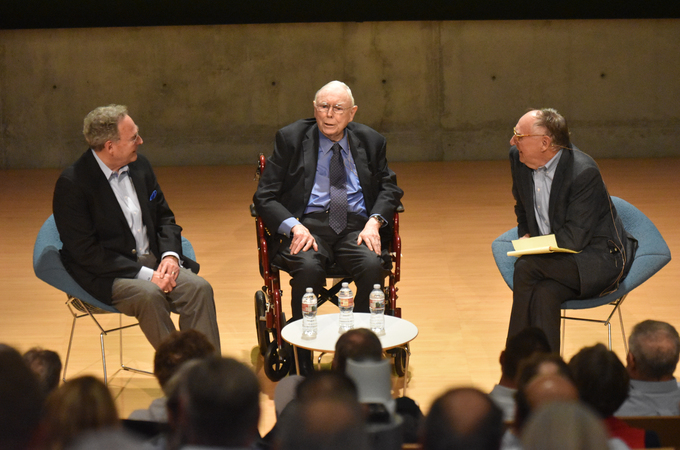A line of people spilled out of the doors of the Esri auditorium on January 29 as renowned investor and philanthropist Charlie Munger sat on the stage between Esri President Jack Dangermond and A.K. Smiley Public Library Director Emeritus Larry Burgess ’67. Their conversation, which was part of the Redlands Forum series co-hosted by Esri and the University of Redlands, touched on a variety of topics—from the stock market to the importance of education.
Munger's career in investing spans nearly 60 years, 42 of which have been in the role of vice-chairman at Berkshire Hathaway, the holdings company owned by Warren Buffet. A resident of Pasadena, California, he has invested in a number of properties and organizations throughout Southern California, including the Parkview Terrace Apartments in Redlands.
“I’ve always been interested in the view of the orange trees against the mountains,” he said, responding to Dangermond’s question about why Munger chose to invest in Redlands. A native Nebraskan, Munger moved to Southern California to pursue a degree in meteorology at California Institute of Technology, kickstarting a lifelong love of the region and learning.
Munger is known for relying on “elementary, worldly wisdom” when it comes to making business and finance decisions, and he prioritizes strong business ethics. Throughout the event, Dangermond and Burgess (also a U of R trustee) sought information from Munger about how and why this philosophical foundation was laid.
Touching on his love of reading, Munger emphasized the importance of self-education and the need to constantly unearth new ideas and concepts. This personal mission directly translates into the value of a liberal arts education, suggested Dangermond.
“It teaches you the basic math of life,” Munger agreed. “Now, when I want to know something, I just learn about it. The habit of figuring something out for yourself is an important thing to develop.”
Steering the conversation toward economics, Dangermond asked after Munger’s opinions about the stock market, politics, and how future generations might fair. Munger remarked that fluctuations in the stock market are “a consequence of adult life,” that “we’ve drifted into far too much hatred,” and that the future will definitely be more difficult for the coming generations.
Toward the end of the event, Munger fielded questions from audience members. One woman asked Munger what he had been passionate about as a young adult and how that led him to find his path.
Munger responded: “My career just happened. A lot of it was what I was born into, and a lot of it was proper training—it wasn’t any extreme ability. One thing I’ve learned is to always inquire. Always ask questions, and look at the vulnerabilities of a situation in order to figure out how to solve it.”
Past Redlands Forums have featured speakers including historian Ed Ayers, activist Ralph Nader, biologist Jane Goodall, The Atlantic editor and correspondent Jim Fallows, former Governor of Arizona and former U.S. Secretary of the Interior Bruce Babbitt, and other leaders in their fields.
Next up in the Redlands Forum is "The History of Wine: From Pangaea to Pasteur" by Wes Hagen ’92, a consulting winemaker for J. Wilkes Wines in Santa Maria Valley, California. Registration, which opens one week prior to the talk, is required. For more information, see the Redlands Forum website.






